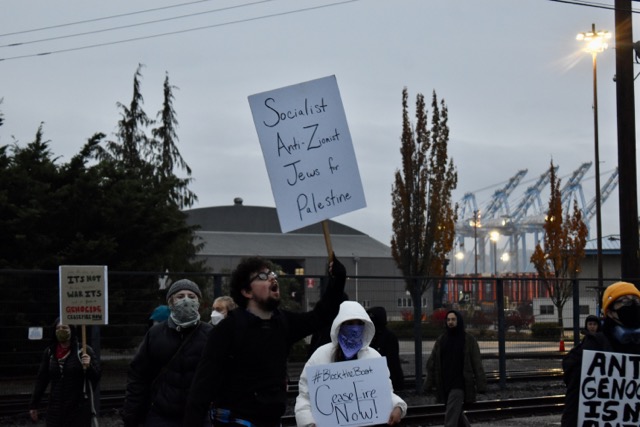
From The Trail’s Editorial Board
What follows represents the views of The Trail’s editorial board as a whole. It reflects conversations had by the editorial board and various stakeholders on the subject. This statement does not necessarily reflect the views of individual Trail writers.
In the Oct. 20 issue, The Trail was honored to publish a joint statement from the Middle Eastern and North African Student Association (MENA) and the Jewish Student Union (JSU) regarding the ongoing war against the population of Gaza, where over 10,000 civilians have died. The well crafted and nuanced statement should have opened the door to a productive campus conversation regarding the war. After all, colleges and universities across the nation are currently alight with conversations, arguments and protests. Thousands of college students have marched in demonstrations, including in Washington. In fact, tensions at the University of Washington (UW) have flared recently due to inflammatory language and actions by both pro-Palestinian and pro-Israel organizers.
However, despite MENA and JSU’s statement, despite the mobilization of college students across the nation, the University of Puget Sound campus seems to suffer from a lack of response to the conflict. This is not to discredit the few campus talks on the subject, nor the hard work by MENA to shuttle students to protests. The Trail is thankful to all members of the community who contribute positively to conversations and action on the subject.
Yet it’s clear that campus, as a community, has largely not responded to a crisis that threatens the lives of a long suffering population of around 2 million innocent civilians. In the words of our professors themselves, they “aren’t touching it.” Students confine their conversations to social media or hide them behind closed doors.
In many ways, the paralysis that grips our campus is understandable. As is the case with UW, many on-campus responses to the siege of Gaza have spawned unproductive conversations or empty actions at their respective universities. Furthermore, campus has had a plethora of issues in our handling of social issues, particularly ones relating to anti-semitism. This institutional climate has no doubt led to some staying silent for fear of backlash.
More importantly, a long, bloody and contended history surrounding the conflict leads to people operating under assumptions, partial truths and pure propaganda. Social media doesn’t help the issue. Misinformation covers social media apps from head to toe, much of it shared by well intentioned students. Misinformed and spoon fed propaganda, our conversations quickly devolve. This has been the case for a long time. So long, in fact, that it seems we no longer have the conversations at all.
That is no longer acceptable. In the face of a crisis of such immense scale, one that threatens to eradicate an entire population from their home, the status quo of silence at this University is no longer tolerable. We have an opportunity to forge genuine conversations that develop helpful and effective action. With such a small student population we have an opportunity to connect with each other, avoiding partisan furor, in ways that develop deeper understandings on the topic.
To do this, the University of Puget Sound campus must exercise a skill that there seems to be a shortage of in our country. We must recognize multiple truths, even ones that society tries to tell us are mutually exclusive, and believe them wholeheartedly. We must stand with the Jewish community, recognizing the dire need to combat anti-semitism at all levels: personal, institutional and societal. We must stand with the Palestinian community, recognizing the fact that they are being subjected to a brutal and illegal collective punishment campaign. It is possible to advocate for the Palestinian cause without being anti-semitic. It is also possible to mourn for the tragic loss of more than 1,400 Israeli civilians without condemning an entire population of Palestinians. Most importantly, it is possible to have these honest conversations with each other.
This process begins with education. Education is often framed as an individual task, something that you alone are responsible for. This view of education, where people are isolated and under immense responsibility to learn the “right” thing, perpetuates the vitriol with which people approach the topic. Instead, our education must be a community education. Honest, critical discourse on the topic could be led by the University itself. This is not to say that the University should be in charge of what our community response is, far from it. Only that as an institution the University has a chance to mobilize its resources towards an important cause.
Our response to the crisis cannot, and must not, end with education. Effective community-wide action must follow. In this we should not feel limited by precedent or conventions, but guided by compassion. Recognizing the resources at our disposal as an institution and as individuals in varying positions of power, the University must mobilize. New policies aimed at preventing and combating anti-semitism should be developed and implemented. Simultaneously, we must engage with the Palestinian cause in meaningful and effective ways. These should be more than simply declaring solidarity; true engagement should have a direct impact in some way on the situation. What these steps look like should reflect the unique conversations our community has.
For our part, The Trail remains committed to covering the war in an honest fashion, without obfuscating the truth to fit a partisan divide. We hope to continue to engage in thoughtful discussions that engage a variety of voices, like the ones that informed this article. We aim to tell the truth about the crisis, while remaining attentive to the needs and voices of vulnerable community members.
The Trail calls for the campus community, as a whole, to shake off the paralysis that seems to have taken hold and begin to address a humanitarian calamity. We admit to our own hesitation and fear to speak on the subject, and hope that we can follow in the lead of MENA in JSU in opening the door to further conversation.
